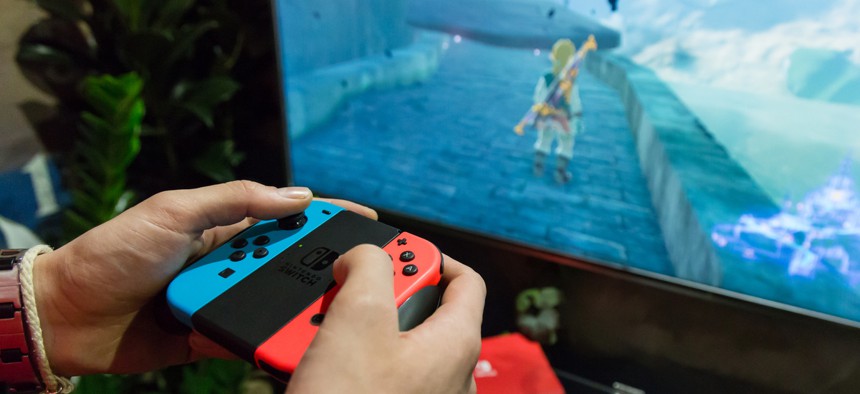When Will Government Get Serious About Gaming Again?

Tinxi/Shutterstock.com
A few years ago, a vocal group within government helped push gaming for training and problem-solving but the momentum seems to have slowed.
It’s been a few years since I covered gamification in government. The concept of gamification comes from using game theory, and ultimately gaming technology, to educate or inform players.
It is one of the best ways to train people in areas where there is a lot of complexity, such as cybersecurity, or for skills like firefighting or soldiering where hitting the real world without sufficient experience can be deadly. It has been used to help solve impossible scientific problems by enlisting millions of volunteer players to “work” on a solution, although the players are just having fun. The most successful example of that is probably the FoldIt Game. Gamers successfully mapped a protein used to combat the AIDS virus in just three weeks, even though the same task had vexed scientists for over a decade.
Games in general are very important to me personally. Video games are my favorite form of entertainment, and I have been covering them for over 20 years. As such, I know how amazing the technology is, and I have seen firsthand, and many times over, how a great game can inspire players, captivate an audience, make a political statement, or even drive someone to tears. (Not me, of course. I’m just saying I know it’s possible. Just don’t ask, OK?) But ultimately, good games are fun to play, and who doesn’t want to have fun?
For a while, it looked like the government was starting to understand this. There was a government gaming group formed, and certain agencies that are more public-facing such as NASA and National Oceanic and Atmospheric Administration began creating great titles that educated and entertained. Even the National Security Agency got into the gamification push a little bit, sponsoring cryptographic quizzes that promoted both careers at the agency and the science of cryptography in general.
However, you won’t find too much news about gamification over the past two years. It’s sad, but government seems to be backing away from most gamification efforts.
I’m not sure if this is a conscious effort because of a change in leadership, or more of a situation where the shine is off the apple, and government has few champions to move the gamification ball forward. In any case, this is a lost opportunity for government, and our nation, especially with the latest Entertainment Software Association survey finding that 65 percent of all American households have at least one member who regularly plays video games.
Government hasn’t completely abandoned all games. The Defense Advanced Research Projects Agency is using a game to test drone swarm technology, which is going to likely become an increasingly important skill on the battlefields of the future. However, the agency is doing this mostly in the physical world, inviting small teams from the armed services to fly real drones in a battle-royale type of competition. That is a somewhat ineffective way to do it if their goal is to find innovative swarm strategies or make a breakthrough in the way that FoldIt did. Players are limited in number, the field is relatively small compared to a real battlefield, and the number of drones is limited.
Why not instead create a game where drone behavior and controls are simulated, and open it up for anyone to play, either against an artificial intelligence using “standard strategies” or simply against each other? They could record all the battles, and then sit back and see what a few thousand players, both military personnel and civilians, come up with when challenged to develop innovative swarm tactics in a competitive wargaming environment. I guarantee that DARPA would be pleasantly surprised with the results.
And there is precedence for this, just not in America. Over in England, the government is sponsoring the Cyber Security Challenge U.K. site, which hosts a collection of video games designed to tackle some of the world’s biggest cyber problems by enlisting the public to help solicit innovative ideas while playing games. The games there run the gamut from highly advanced simulations that require rudimentary hacking skills (entering a code on a live website using Telnet commands) to gain entry, to those open to anyone with an inquiring mind willing to help contribute to their country’s defense.
The games on the U.K. site refresh often. The ones currently featured involve such hot topics as identifying insider threats within organizations, spotting unsecure code, and one that uses the actual Minecraft video game and repurposes it toward computer forensics. The site also hosts tournament type competitions, where the best teams earn the right to play in subsequent rounds, with the ultimate winners receiving some type of monetary prize or even a vacation trip. That makes gamification in the U.K. rewarding for both players and government, beyond even the fun of playing the actual games.
I don’t think the United States has totally given up on gamification. It may just not be a focus right now. Case in point, there is a Serious Play Conference coming to the D.C. area in July that features a host of government speakers from the Navy, the National Science Foundation, the Education Department, the Federal Emergency Management Agency, the CIA and others. Hopefully that will help to reboot gamification at the federal level, because right now, other countries are earning all the high scores from their more robust game-based programs, and all the benefits that come with it.
John Breeden II is an award-winning journalist and reviewer with over 20 years of experience covering technology. He is the CEO of the Tech Writers Bureau, a group that creates technological thought leadership content for organizations of all sizes. Twitter: @LabGuys






